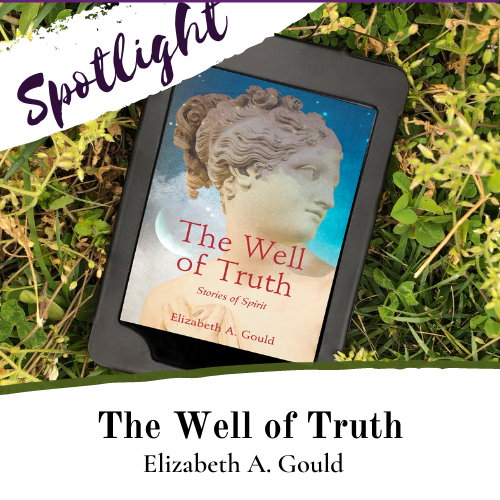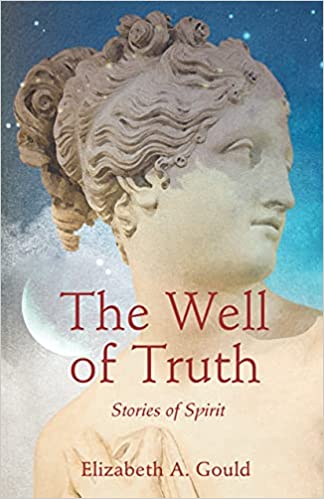Published by She Writes Press on June 14, 2022
Genres: Fiction / Feminist, Fiction / Magical Realism, Fiction / Short Stories (single author), Fiction / Women
Pages: 152
Incorporating elements of fantasy, mysticism, and lore, The Well of Truth follows a female heroine through poignant moments of her adult life. Through the initiations of marriage, raising children, getting divorced, going through menopause, losing loved ones, and ultimately making an independent life for herself, she gains insight and spiritual wisdom from unexpected places.
These short stories are filled with reflections on feminine resilience, power, and agency.
Today’s spotlight is for Elizabeth A. Gould’s The Well of Truth the story of a woman named Grace who is on a journey of self discovery. Through the telling of significant moments in her adult life, Grace garners insight and inspiration to create a meaningful and authentic life for herself. The book is filled with reflections on feminine resilience, power, and agency.
Thank you to the team at FSB Associates and the Author for providing an excerpt for us to enjoy!
Excerpt from Eclipse
GRACE SAT ON THE CORNER OF SIXTH AVENUE AND Christopher Street with her eyes fixed on the sky. Though it was well past midnight on a bitter cold night, the city was alive with honking, jostling cabs, and the sidewalks congested with people migrating from bars and restaurants. The man siting in the newspaper kiosk glowered suspiciously at her, but she was not going to let his disapproving looks or the cold weather distract her from her mission.
Shortly after getting married, Grace and Jack relocated to New York City for his work, landing in a small apartment in the West Village. When she went back to school to get her teaching degree, she signed up to take an astronomy class. She had always been intrigued by the subject, even if a disparaging high school teacher had once told her she had no aptitude for science. Though she’d carried that judgement into her adult life, where she consistently avoided anything related to science or mathematics, her desire to learn about the night sky had become stronger than her fear of failure.
Every window in their tiny apartment looked out on an air shaft, making it impossible for Grace to do her skygazing homework from home. On a nightly basis, she prowled like a wolf around the neighborhood, searching for an open piece of sky. Her assignment that cold winter night was to watch a full lunar eclipse from start to finish, so she dressed herself in layers of ski clothes before settling down on the steps of the Jefferson Market Library. She pulled her notebook out of her purse, thinking about that first day of class.
Wearing a Harris tweed jacket, Professor Davidson cut an imposing figure as he stood at the podium, surveying the crowded auditorium. With his first words, uttered in a thick Scottish burr, he posed a question: “What is the moon made of, and why does it shine?”
Not certain of the answer, Grace doodled intently in the margins of her notebook. All around her, throats cleared, and feet shuffled. Professor Davidson stood frozen at the lectern, his ear cocked to one side, waiting. After several moments of awkward silence, he muttered sotto voce, “This…is…a…problem.”
He launched into a dramatic soliloquy that had every student sitting at the edge of their seat.
“The time has come for each of you to reclaim your birthright!” he announced. (Grace wrote those words in bold across the front page of her notebook.) “Every human being is entitled to know the secrets of the celestial rhythms. From this moment on, you will need to watch the sky like detectives. You must take notes, make sketches, record your observations. In this way, you will come to understand the great cosmic mysteries.”
Professor Davidson’s speech was thrilling, but each time he used a technical word like apogee or azimuth, Grace felt uneasy. That she did not know the meaning of these words only seemed to reinforce her belief that she had no talent for science. How could she reclaim her birthright if she didn’t possess the intellectual ability to understand it? She held onto the armrests of her chair, fighting the impulse to get up and leave. Suddenly she was back in high school, reliving that terrible day when she was learning about universal gravitation in science class. She had asked a question about the effect of gravity on the moon, accidentally using the pronoun she instead of it when referring to the heavenly body. Her teacher, a consummate scientist, sneered at her choice of words, reminding her in front of the entire class that they were studying science, not poetry. The boys at the back of the room sniggered, calling her “moon girl” for the rest of the year.
Though she felt mortified at the time, it was true that Grace felt a personal affinity with the moon. One of her most treasured childhood memories was of a cool, autumn evening on the way home from dinner at Grandma’s house. Sitting in the backseat of the family’s wood-paneled station wagon, she’d made an astonishing discovery. The golden harvest moon had followed the car across town, even as it turned corners and stopped at red lights. When the car pulled into the driveway, she was amazed to find the moon shining down benevolently on the roof of her house. The moon knows where I live!
Having learned about Greek mythology in school, Grace imagined that Artemis, the maiden goddess of the moon, was her secret friend and confidante. Together they ran barefoot down the beach and climbed gnarled oak trees in the park. Artemis taught Grace many wonderful things, including how to talk to animals and the proper way to catch moonbeams in a bowl of water.
When Grace entered high school, she realized that her friends were more interested in boys and parties than in stargazing or Greek goddesses. Begrudgingly, she distanced herself from Artemis, though whenever she glimpsed the moon in the sky, she always sent a covert greeting.
A cyclist singing “Roxanne” at the top of his lungs zoomed down Sixth Avenue, jolting Grace out of her reverie. She remembered that Professor Davidson said the word lunatic came from luna, Latin for moon, because the ancients believed the full moon had the power to make people go crazy. Just then, a taxicab veered over to the curb in front of her. She recoiled as a young Wall Street type vomited out the rear window, causing her to wonder what Jack and his buddies were up to that evening.
Between the chaos on the streets and the drama in the sky, Grace was thoroughly entertained, though her bones ached with cold. She watched the full moon diminish until it was completely enveloped in shadow, at which point it turned the color of rust. Though the so-called “blood moon” was spooky in both name and affect, she knew it was a phenomenon called Rayleigh scattering, which occurred when air molecules from the earth’s atmosphere scattered out most of the blue light so that the remaining light cast a red glow on the moon’s surface.
She jotted down some of her observations, realizing as she wrote that her connection to the moon could be both soulful and intellectual. The knowledge of science enhanced her intuitive experience, creating a wider lens for her continuing conversation with Artemis.
When a tiny portion of moonlight escaped from the other side of the umbral shadow, she stood up abruptly, waving her arms in the air.
“Look, look!” she gestured to passersby. “The light is coming back!”
People on the street avoided making eye contact with her, assuming that she was out of her mind. (Why else would a woman in ski clothes be loitering outside on a cold winter night?) The news vendor, clearly embarrassed for her, turned his attention back to his portable TV.
Can’t they see what’s taking place in the sky?
IT WAS THREE in the morning when she headed back to the apartment. The moon slumped wearily behind a water tower, like a helium balloon with a slow leak. Grace hurried past the Korean deli, the shoe repair shop, the dry cleaners on her way home, her warm bed the only thing on her mind. When she arrived at her building, she noticed a beam of silvery light shining down on the front stoop. Even after all those years, the moon still knew where she lived.
About Elizabeth A. Gould

Elizabeth Gould received a BA in Art History from Stanford University, and worked in the Old Masters art world in New York City for several years. After obtaining an MS in Education from S.U.N.Y., she became a rites of passage educator for girls and women, and the director of a non-profit committed to positive menstrual/menopausal education and awareness. The themes in The Well of Truth grew organically out of her two decades of experience as a mother, teacher, and menstrual activist as well as her love of mythology, goddess traditions, and the moon. Devoted to finding the magic and beauty hidden in daily life, she is thrilled to be part of the rising chorus of voices reclaiming and celebrating the wisdom of the Feminine. Although she is an inveterate traveller, Elizabeth feels most at home in Aotearoa, NZ. The Well of Truth is her first book.





